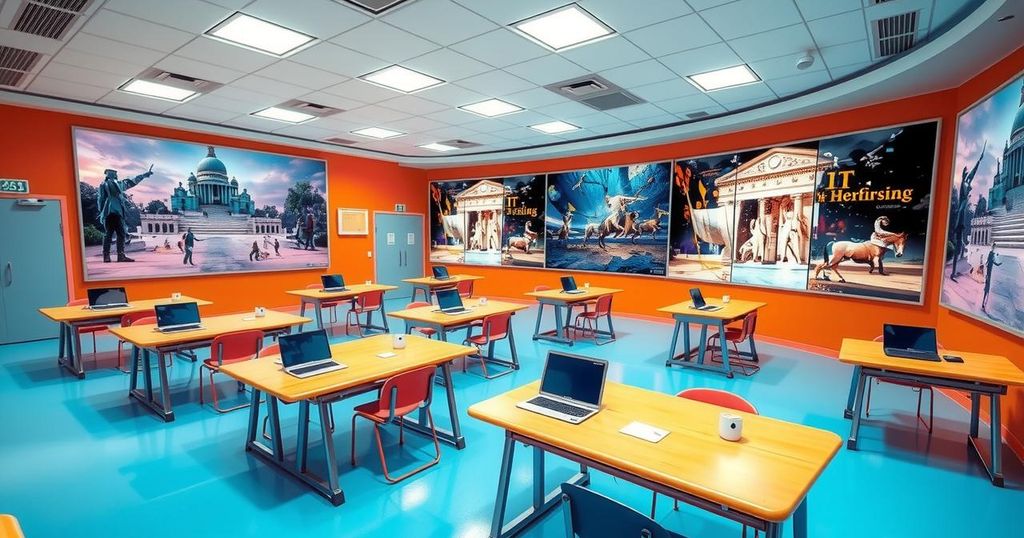The Best-Case Scenario for AI in Schools
Amid growing fears about AI’s impact on education, Sal Khan, founder of Khan Academy, shares an optimistic vision for its future in classrooms. He discusses how AI could serve as an invaluable tool, enhancing personalized learning experiences while maintaining the essential human element of teaching. The potential of AI to inspire creativity and joy in students is also emphasized, painting a hopeful picture for the future of education.
The world of AI is evolving at a blistering pace, and yes, it can be a bit unsettling. You’ve got to wonder how this will play out in our schools, especially for our children. Many parents are understandably concerned that an over-reliance on AI might undermine vital skills like reading, writing, and critical thinking. Yes, some students are cheating with these tools, and on the flip side, some teachers are turning to AI to streamline lesson plans. There’s a mixed bag of responses out there, and not much solid data to gauge how AI is truly affecting learning outcomes.
In the midst of these worries, I reached out to Sal Khan, the founder of Khan Academy, which many families, including mine, rely on for educational support. Khan is known for advocating the positive potential of AI in education, and I wanted to hear his perspective on how this technology could actually be a game changer in classrooms. What he shared was truly eye-opening, and now, I’m more hopeful than ever.
During our conversation, Khan tackled some of those fears head-on. He said, “What I always like to do is to think about what the goals of writing and reading were when they first came about.” He explained that communication and structure of thought are key. He believes AI can enhance education rather than detract from it. Instead of replacing teachers, AI could function as an assistant, amplifying the human touch in education.
Khan painted a vivid picture: Imagine if your child’s district found a million bucks and hired brilliant graduate students to assist in classrooms. These students would not be there to replace teachers, but rather to support them by offering personalized help to every kid. If a teacher notices a child isn’t as engaged, those grad students would relay that information in real-time, allowing lessons to be tailored to each student’s interests. Wouldn’t that be a parent’s dream scenario?
However, the future still has uncertainties. While jobs may start getting replaced by AI, Khan maintains that teachers will still play a critical role in education. “Teachers are super-important actors in a human setting. They hold students accountable and unlock personal connections,” he says. Those interpersonal skills—conflict resolution, accountability, effective communication— are irreplaceable.
But what about rekindling that flame of joy for learning? “AI might actually make kids more excited about learning,” Khan claims. With personalized content and simulations that bring lessons to life, education may become more relatable for students. Imagine talking to a virtual historical figure or experiencing ancient places in three dimensions; it could make learning feel like an adventure. Isn’t that just mind-boggling?
Khan isn’t merely daydreaming. He sees a future where virtual reality enhances learning experiences exponentially. Picture a class turning into a field trip inside a human body or walking through the ruins of Rome, a super-engaging way to absorb knowledge.
Just as important, Khan believes that AI can also enhance creativity. “It will amplify whatever your intent is,” he insists. Those who seek to cut corners may still do so, while the more creative thinkers will find infinite ways to innovate. He draws parallels with how he uses AI to sharpen his own speeches, proving it can serve as a powerful partner in the process.
So, will we embrace this technology that has so many implications for the future of learning? It’s all about how we nurture it.
If you’re intrigued and want to keep up with similar stories, make sure to subscribe to The Essential List newsletter for more insights and features.
In summary, while concerns about AI replacing traditional educational methods persist, voices like Sal Khan assert that with the right approach, AI could revolutionize learning. By personalizing educational experiences and enabling real-time feedback, AI might not only aid teachers but also spark a renewed passion for learning in students. As we navigate this uncharted territory, it’s key for parents and educators alike to stay informed and engaged on how to integrate AI positively into schools.
Original Source: www.bbc.com




Post Comment